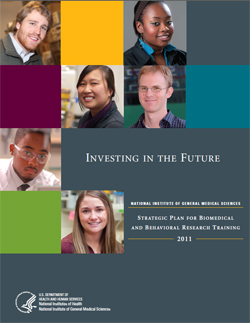In the first major reorganization of NIGMS since 1994, we have just established two new divisions that bring together existing NIGMS programs with programs transferred to NIGMS from the former National Center for Research Resources (NCRR). These changes give us the opportunity to create synergies and strengthen efforts in areas that are central to our mission.
The Division of Training, Workforce Development, and Diversity (TWD) merges NIGMS research training programs with activities that were previously in the Institute’s Division of Minority Opportunities in Research (MORE). It also houses the Institutional Development Award program from NCRR. Our decision to create this division was informed by input we received from many stakeholders, and it responds to key goals and recommendations of our strategic plans. Its director is Clif Poodry, who formerly directed the MORE Division.
The Division of Biomedical Technology, Bioinformatics, and Computational Biology (BBCB) combines programs of our Center for Bioinformatics and Computational Biology (CBCB) with biomedical technology programs from NCRR. Karin Remington, who previously directed CBCB, is the director of this new division.
You might be wondering what the reorganization will mean for your current or future funding. The amount of money allocated to programs in the new divisions will not change as a result of the reorganization or the transfer of NCRR programs to NIGMS. The review of applications will stay the same, too, as will most of the staff who manage the grants and review the applications.
Our current organizational chart shows all six NIGMS divisions, including the two new ones.
I’ve been at NIGMS for many years—first as a program director, then as a division director and twice as acting Institute director. One of the things I like best about all these jobs is having a bird’s-eye view of the rapid evolution of science. The reorganization that is taking place at NIGMS reflects this evolution and, I expect, will enable NIGMS to further enhance the pace of science.

 Earlier this year, we issued a Blueprint for Implementation of our Strategic Plan for Biomedical and Behavioral Research Training. Since then, we’ve developed guidance to help the academic community implement the plan. This includes several short documents on the topics below:
Earlier this year, we issued a Blueprint for Implementation of our Strategic Plan for Biomedical and Behavioral Research Training. Since then, we’ve developed guidance to help the academic community implement the plan. This includes several short documents on the topics below: